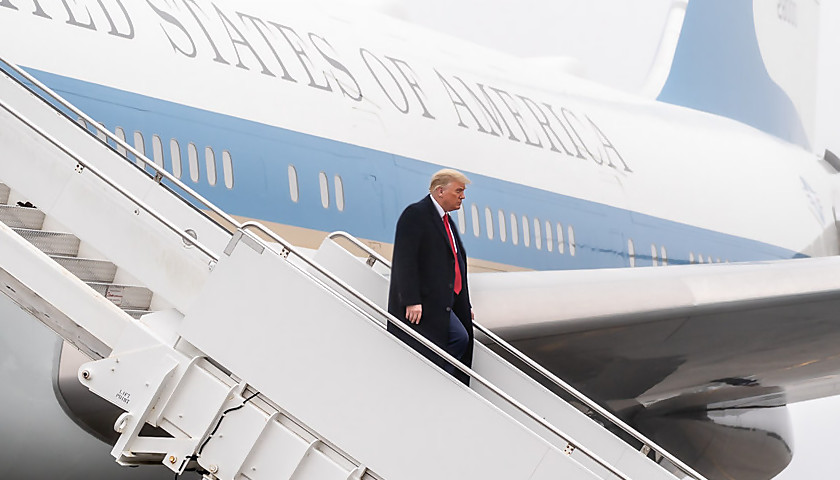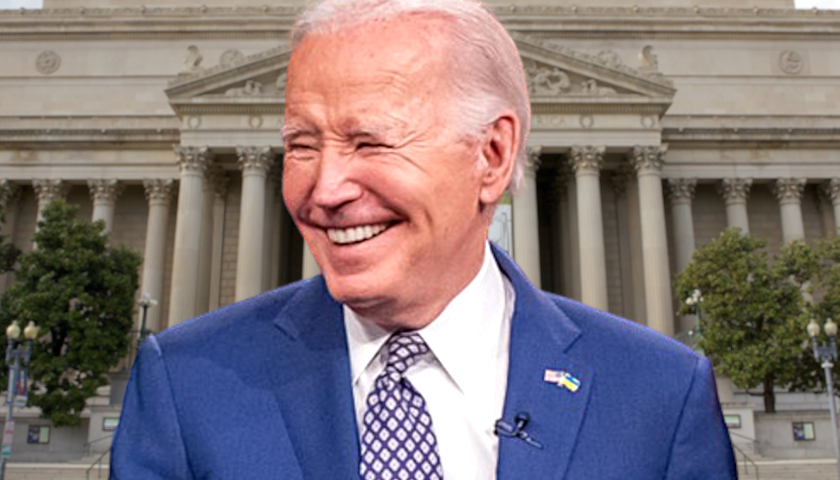by Ken Masugi
To understand President Trump’s signing of the latest so-called COVID-19 “stimulus” bill after days of veto threats, we need to understand the critical constitutional history of the Watergate era.
Citing the Impoundment Control Act of 1974, Trump declared, “I will sign the Omnibus and COVID package with a strong message that makes clear to Congress that wasteful items need to be removed. I will send back to Congress a redlined version, item by item, accompanied by the formal rescission request to Congress insisting that those funds be removed from the bill.”
The president’s congressional allies will likely insist that before his proposed $2,000 stimulus checks could be issued, the Senate would need to make cuts at least equivalent to the amount the $2,000 adds to the overall expense, estimated at upwards of $40 billion. Such a move seems too obvious for Congress – after all, how many incumbents would remain in office if they could not spend beyond the government’s means?
To this, Trump is also demanding social media regulation (as he did in his overriden veto of the defense bill) and voting fraud investigations, which are not in the signed legislation. Will Majority Leader Mitch McConnell try to make Trump’s last-minute move vanish (perhaps along with his majority leader status) or will he use his stealthy tactics for the mutual benefit of the president and himself?
When attacking Trump and his Department of Justice for hyperpartisanship, critics should recall for whom the main department building is named: Robert F. Kennedy, the very model of a partisan attorney general. And keep in mind who was responsible for that grotesque naming – not a liberal Democratic president, but the mere moral equivalent, George W. Bush.
Trump is too often attacked for self-promoting grandstanding. He is said to act out of narrow self-interest: trashing an opponent or keeping himself protected from prosecution. But in this latest instance – given that he is denied a line-item veto, which would allow him to delete objectionable parts of the legislation – Trump instead turned to the Impoundment Control Act of 1974, which authorizes him to identify unnecessary or wasteful parts of a law and then transmit to both houses of Congress a special message describing the amount in the law to be reserved, the sources and effects of the rescission, and the rationale for it.
Then Congress must approve Trump’s request – virtually impossible.
So, like Richard Nixon before him, is Trump now meekly submitting to a law a bipartisan Congress forced upon him, a law he would prefer to reject? Is this a humiliating defeat of an overly divisive president who exceeded his authority? Against the consensus, I would argue that this episode shows Trump is politically far more successful than Nixon, even though any victory he may win here is far from conclusive.
Perhaps President Trump will argue in court that Congress must approve his request – that is, while Nixon signed the Impoundment Control Act of 1974 into law under political duress, it is unconstitutional, and that Nixon’s original impoundment decision is a legitimate part of “the executive power,” as essential to faithful execution of his oath of office. Indeed, Matthew Spalding testified in March that the act “has been unraveling from the beginning . . . and has all but totally collapsed.”
Is there a court somewhere that might rule the Impoundment Act an unconstitutional violation of the separation of powers?
Attacks on Trump inevitably make unflattering comparisons with Nixon, the politician deemed to be the ultimate partisan and political hyena, and pundits were eager to dwell on extensive correspondence between the two men, including flattering comments from Nixon about Trump’s political future.
What political strategy might the two have discussed over the phone or in private apart from what was in the letters? Might Nixon last week have been speaking from the grave through Trump? And what might Nixon advise about a law whose passage showed him he lacked the power to govern?
Nixon and Trump’s thinking and actions are best illuminated by reference to the profoundest student of Nixon, John Marini. In his latest book, Unmasking the Administrative State, Marini points out that Nixon – the first president following Lyndon Johnson’s establishment of the Great Society, which was the culmination of the 20th century’s Progressive politics – was the first to oppose this project on constitutional grounds. Nixon’s fate exemplifies what happens to serious, principled opponents of progressivism: defenders of the constitution are turned into its enemies.
Perhaps the most controversial essay in Marini’s book, “The Role of Bureaucracy in the Watergate Affair,” notes the parallels between Nixon’s enemies and Trump’s. Nixon’s Democratic enemies never forgave his investigation revealing the Communist ties to elite members of their party. But by 1968, his exposure of the Democrats had increased in scope.
By the end of the 20th century, following Ronald Reagan’s rhetorical assault on the administrative state, it became clear that “it was an element of government itself, the bureaucracy, which had established the purpose and unity of the political branches, and with the blessings of the courts . . . . In short, political rule of law gives way to executive or administrative discretion,” meaning willfulness. Reagan’s first inaugural denounced the arrogance of elites, who denied self-government. Impeachment became a political tool for the Left and its allies to support the administrative state against its enemies. Any excuse for impeachment will do.
Both Nixon and Trump threatened the Left’s hold on political power in the way no other Republicans besides Reagan did, and the Left attempted to use the Iran-Contra affair against Reagan. Marini’s earlier book, The Politics of Budget Control (1992), raises parallels between Nixon’s anti-progressive political agenda and Trump’s. Quoting nationalist U.S. Senator Albert Beveridge, Nixon referred to himself as a “partisan of principle.” This “method of patriotism” reveals “a prince of citizenship.”
Nixon’s “revolutionary” presidency sought to save constitutional government by centralizing more power in the White House, taking it from the different cabinet departments and agencies. To many conservatives, Nixon appeared to be a mere political opportunist. In the eyes of liberal White House intellectuals such as Arthur Schlesinger, Nixon became an “aberration” and “wholly inconsistent with the American political tradition . . . . He looked at the other ruling elements of the political order (not only Democrats) as though they were enemies of the regime.”
Quoting Schlesinger again, Marini pointed out in 1992 that “It is the less educated, low-income whites who tend to be the most emotional and primitive champions of conservatism . . . . The affluent and better educated, on the other hand, tend to care more about rationality, reform, and progress.” Of course, the Left turns this focus on the motives of lesser-educated whites into a bogeyman about racism, when the issue is clearly about patriotism. (Note sophisticates’ cringing at Trump slogans “America First” and “Make America Great Again.”)
As Aristotle noted long ago, the essential qualification for high public office is patriotism, love of country, in which recent presidents proved to be lacking in various ways. But Trump’s coalition is not just “deplorable” whites but immigrants as well, who love their adopted country. Trump’s vision of a patriotic Republican workers’ party, with its implications for foreign policy, international trade, and immigration, is well underway.
These parallels between Nixon and Trump provide the context for the wrangling over impoundment. A major part of the House’s impeachment charge against Trump was his delay in sending congressionally approved aid to Ukraine. That, in turn, reflected Trump’s detestation of the Congressional Budget Office (CBO) and his own White House shop, the Office of Management and Budget (OMB).
“The separation of powers was intended to protect political rule – the chief end of which is liberty,” Marini concludes. “Bureaucratic rule is indifferent, if not hostile, to the maintenance of the conditions of freedom.”
Nixon showed his mettle in being the first president to oppose the progressivism behind the destruction of constitutional government in this new administrative state, and for his troubles may forever receive bipartisan damnation as a violator of the Constitution and individual rights. Trump proved a better politician but was denied reelection anyway under suspicious circumstances, to be sure. He will not go down in history for his indifference to budgets but should instead be remembered for his defense of constitutional government and its freedoms, morally, legally, and, above all, politically.
– – –
Ken Masugi, Ph.D., is a senior fellow of the Claremont Institute. He has been a speechwriter for two cabinet members, and a special assistant for Clarence Thomas when he was chairman of the Equal Employment Opportunity Commission. Masugi is co-author, editor, or co-editor of 10 books on American politics. He has taught at the U.S. Air Force Academy, where he was Olin Distinguished Visiting Professor; James Madison College of Michigan State University; the Ashbrook Center of Ashland University; and Princeton University.





